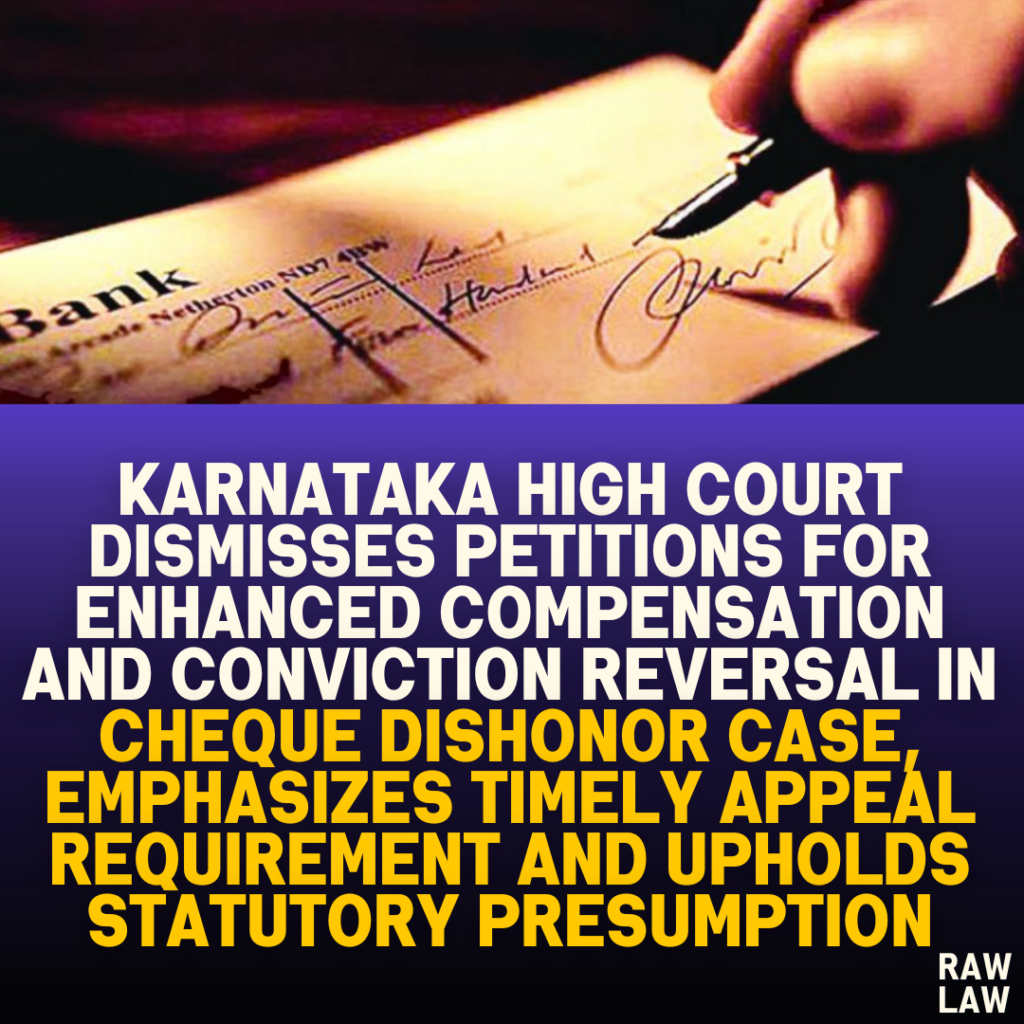Court’s Decision: The High Court of Karnataka dismissed both criminal revision petitions filed by the accused and the complainant. The accused’s petition challenging his conviction under Section 138 of the Negotiable Instruments Act, 1881, was rejected, as was the complainant’s petition seeking an enhanced fine. The Court held that the Trial Court’s order required no interference and emphasized that the complainant’s request for enhancement was not sustainable as it was raised for the first time at the revision stage.
Facts: The complainant filed a case under Section 200 of the Code of Criminal Procedure, alleging that the accused had borrowed a loan of ₹4,70,000 on January 20, 2013, with a promise to repay it shortly. Toward repayment, the accused issued a cheque, which was dishonored due to insufficient funds. Following a legal notice, which was ignored by the accused, the complainant initiated legal proceedings.
Issues: The main issues before the Court were:
- Whether the accused could rebut the presumption under Section 139 of the Negotiable Instruments Act, 1881, for dishonoring the cheque.
- Whether the complainant could seek enhancement of the fine through revision when no appeal was filed in the first appellate court.
Petitioner’s Arguments: The accused argued that the conviction under Section 138 was unjust and that the evidence was insufficient to prove guilt. The accused sought acquittal based on alleged procedural and evidentiary inadequacies in the initial proceedings.
Respondent’s Arguments: The complainant contended that the Trial Court’s fine was inadequate and sought a revision for enhancement, arguing that the compensation should be increased to double the cheque amount, i.e., ₹9,40,000.
Analysis of the Law: The Court reviewed Section 138 of the Negotiable Instruments Act, which criminalizes cheque dishonor due to insufficient funds, and Section 139, which presumes liability unless rebutted. The Court found that the accused failed to provide any evidence to counter the presumption of liability, thus supporting the initial conviction and fine.
Precedent Analysis: The Court applied existing legal standards related to Section 138 offenses, which require defendants to rebut the statutory presumption once a cheque is dishonored. The Court upheld prior interpretations that affirm conviction based on failure to counter this presumption.
Court’s Reasoning: The Court reasoned that since the accused did not offer rebuttal evidence and the signature on the dishonored cheque was undisputed, the presumption under Section 139 held strong. Additionally, the Court observed that the complainant should have appealed for enhancement in the first appellate court, rather than raising it for the first time in the revision stage.
Conclusion: Both the criminal revision petitions were dismissed. The Court allowed the accused an extension until November 15, 2024, to pay the remaining fine, failing which the original sentence of simple imprisonment would automatically apply.
Implications: This decision underscores the binding nature of statutory presumptions under the Negotiable Instruments Act, 1881, and reiterates that claims for enhanced compensation must be raised timely, within appropriate appellate channels, rather than at the revision stage. The judgment also reflects the Court’s discretion in upholding Trial Court findings absent a substantial rebuttal.




Pingback: Gauhati High Court Orders Mizoram to Proceed with Land Acquisition Under Central Act; Rules State Law Invalid Due to Absence of Presidential Assent, Article 14 Breach, and Article 371(G) Constraints - Raw Law